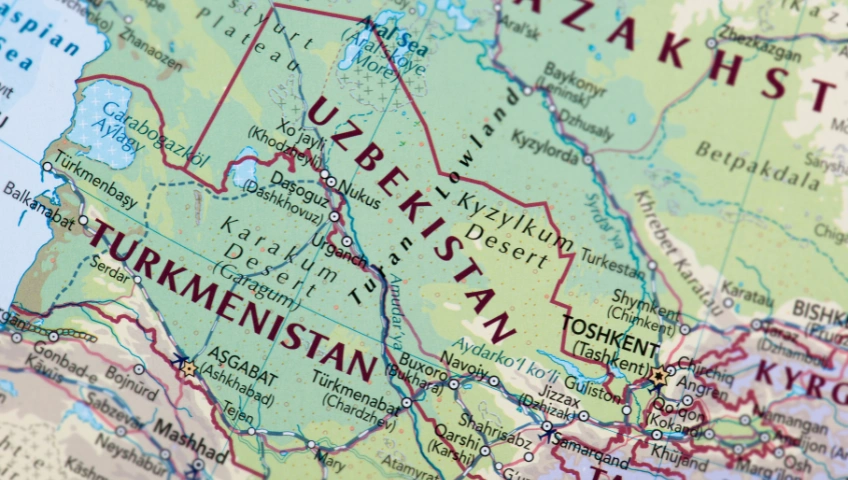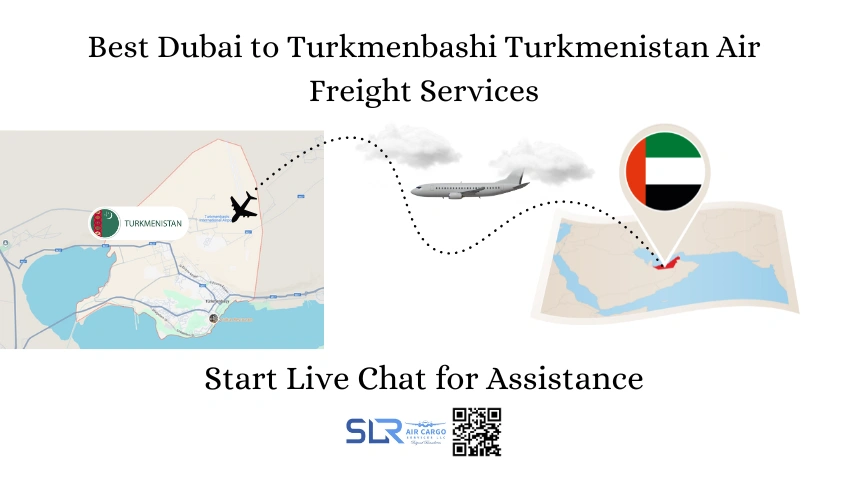Turkmenbashi International Airport, located in the city of Turkmenbashi on the Caspian Sea coast of Turkmenistan, is a fascinating study of architectural ambition and air travel realities in a somewhat isolated nation. SLR Air Cargo provides Dubai to Turkmenbashi, Turkmenistan Air Freight Services at a cheap rate. Here’s a breakdown of what makes this airport noteworthy:
We request to Start Live Chat for Assistance
Architectural Grandeur & The Shadow of Turkmenbashi’s Legacy: Dubai to Turkmenbashi
- The “Falcon” Design: The airport’s most striking feature is its distinctive bird-like design, often likened to a falcon spreading its wings. This is not accidental; the falcon is a national symbol in Turkmenistan, and this architectural motif was likely mandated during the presidency of Saparmurat Niyazov, also known as Turkmenbashi (“Leader of the Turkmen”). Niyazov had a penchant for grandiose projects, often incorporating national symbols into his building plans.
- Marble and Gleaming Surfaces: True to Turkmenbashi-era aesthetics, the airport features extensive use of white marble, polished floors, and high ceilings. The interiors are often meticulously clean and feel spacious, contributing to a sense of almost sterile grandeur. This lavish use of expensive materials reflects the country’s oil wealth and the emphasis on creating a sense of national pride.
- Monuments and Statues: Like many public spaces in Turkmenistan, you may encounter statues, portraits, and other iconography associated with the leadership, reinforcing the strong personality cult that still influences the country’s culture. These elements further illustrate the airport’s ties to the legacy of Turkmenbashi.
Practicalities & Operational Reality:
- Relatively Quiet Operation: Despite its impressive scale, Turkmenbashi Airport typically sees a relatively low volume of passenger traffic compared to other major international airports. The country’s limited visa regime and unique political landscape contribute to fewer international flights.
- Primarily Serves Domestic and Regional Routes: While designated an “international airport,” the majority of flights operating at Turkmenbashi primarily connect to domestic destinations within Turkmenistan, with some regional connections to countries like Turkey and Russia.
- Modern Amenities (but Underutilized): The airport boasts modern amenities like a duty-free shop, cafes, and lounges. However, given the lower passenger traffic, these facilities are often not as bustling as you might find in a more heavily used airport.
- Security Measures: Be prepared for heightened security measures, typical for airports in the region. This might include baggage screenings and questioning from airport personnel.
- Limited Information Availability: Information about flights, schedules, and the airport itself can sometimes be difficult to find online, reflecting the country’s controlled information environment.
Turkmenbashi International Airport is an interesting juxtaposition of opulent architecture and the realities of limited air traffic. It’s a testament to the grand ambitions of the Turkmenbashi era, showcasing the nation’s wealth and focus on creating monumental public works. However, it also highlights the country’s isolation and the unique challenges it faces in terms of international connectivity.
Petrochemicals air shipment from Dubai to Turkmenbashi, Turkmenistan
Understanding the Context:
- Dubai’s Role: Dubai is a major hub for trade and logistics in the Middle East, with significant petrochemical production and distribution. Its well-established port infrastructure (Jebel Ali) and airport (Dubai International and Al Maktoum International) make it a crucial origin point for air and sea cargo.
- Turkmenbashi’s Significance: Turkmenbashi, as a port city on the Caspian Sea and home to a major refinery complex, is a crucial point for receiving and processing petrochemical products in Turkmenistan. The city also serves as a gateway for goods entering the country via the sea and air.
- Petrochemicals as Cargo: Petrochemicals, ranging from base chemicals to plastics and polymers, are often high-value and sometimes hazardous goods that require careful handling and transportation.
Key Considerations for Air Shipment:
- Product Type:
- Classification: Different petrochemicals have varying properties (flammability, toxicity, reactivity) and therefore are subject to specific regulations for air transport. The correct classification is essential for proper packaging, labeling, and documentation.
- Packaging: Liquids are often transported in drums or IBCs (Intermediate Bulk Containers), while solids might be in bags or sacks. Packaging must comply with IATA (International Air Transport Association) regulations for air freight.
- Temperature Control: Some petrochemicals require temperature control during transportation to maintain their quality and stability. This may involve specialized containers or handling procedures.
- Regulatory Compliance:
- IATA Dangerous Goods Regulations (DGR): All shipments of dangerous goods (which many petrochemicals are) must strictly adhere to IATA’s DGR guidelines. This includes proper packaging, labeling, documentation, and handling protocols.
- Customs and Import Regulations (Turkmenistan): Turkmenistan has its own customs regulations regarding the import of petrochemicals. These might involve import licenses, tariffs, and specific documentation requirements.
- Export Regulations (UAE): Dubai also has its export regulations that must be followed when shipping petrochemicals.
- Air Freight Carriers:
- Specialized Cargo Airlines: Not all airlines are equipped to handle petrochemical shipments. Specialized cargo carriers with experience in transporting dangerous goods are preferred.
- Capacity and Aircraft Type: The type and quantity of petrochemicals to be shipped will determine the appropriate aircraft and its payload capacity.
- Transit Time: While air freight is faster than sea transport, transit times can vary depending on the airline, routing, and any necessary layovers.
- Documentation:
- Shipper’s Declaration for Dangerous Goods: This crucial document outlines all the necessary information about the petrochemical product being shipped, including its UN number, proper shipping name, class, and packing group.
- Commercial Invoice and Packing List: These are standard trade documents required for customs clearance at both the export and import locations.
- Certificate of Origin: This document verifies the origin of the petrochemicals, which can be relevant for customs duties.
- Import Permits/Licenses: Necessary documentation to import the petrochemical products to Turkmenistan
- Logistics and Handling:
- Secure Storage at Origin and Destination Airports: Special storage areas may be required for petrochemicals awaiting shipment or customs clearance.
- Proper Handling and Loading/Unloading: Trained personnel are needed to handle the cargo safely and ensure that it’s properly loaded and unloaded from the aircraft.
- Coordination Between Parties: This requires strong coordination between the shipper, freight forwarder, airline, customs brokers, and the recipient in Turkmenbashi.
- Cost:
- Air freight rates for petrochemicals can be higher due to the specialized handling and regulatory requirements.
- Other costs: Consider additional expenses such as packaging, documentation, customs clearance fees, insurance, and possible storage fees.
Challenges and Considerations:
- Complexity of Regulations: Navigating the complex regulations surrounding the shipment of dangerous goods can be challenging and requires expertise.
- Language Barriers: Communication might be an issue, requiring translation services or experienced professionals who understand both the language and cultural nuances of the region.
- Political and Economic Factors: The political and economic climate in both the UAE and Turkmenistan can sometimes impact trade and logistics.
- Limited Air Connectivity: Although Turkmenbashi Airport is designated as international, finding direct flights and cargo capacity may be a challenge.
- Ground Handling Infrastructure: It’s essential to ensure that Turkmenbashi Airport and its associated logistics companies are capable of handling the specific type of petrochemicals being shipped.
Best & Cheapest Dubai to Turkmenbashi Turkmenistan Air Cargo – Air Freight Services
We request to Start Live Chat for Assistance
Heavy Equipment Air Shipment from Dubai to Turkmenbashi, Turkmenistan
Understanding the Context:
- Dubai as a Sourcing Hub: Dubai is a significant trading hub for heavy equipment, with access to manufacturers and distributors worldwide. This makes it a common origin point for machinery heading to various regions.
- Turkmenbashi’s Industrial Needs: Dubai to Turkmenbashi, with its oil and gas industry, port operations, and ongoing infrastructure development, has a continuous need for heavy equipment like construction machinery, drilling rigs, and specialized industrial tools.
- Heavy Equipment as Cargo: This category encompasses a wide variety of items, including excavators, cranes, bulldozers, drilling equipment, generators, and large industrial machinery components. These are typically bulky, heavy, and often require special handling.
Key Considerations for Air Shipment:
- Equipment Dimensions and Weight:
- Oversized Cargo: Heavy equipment often exceeds the standard dimensions and weight limits for conventional air cargo. This requires specialized aircraft, custom loading procedures, and careful route planning.
- Weight Distribution: It’s crucial to accurately determine the weight and center of gravity of each piece of equipment for proper loading and to ensure the safe flight of the aircraft.
- Aircraft Selection:
- Cargo Aircraft Type: Suitable aircraft might include Antonov An-124s, Boeing 747 freighters, or similar large-capacity cargo planes capable of handling oversized and heavy items.
- Aircraft Availability: Finding an available aircraft with the required payload capacity and door dimensions can be challenging and may require booking well in advance.
- Loading and Unloading Capabilities: Airports at both the origin and destination must have the necessary ground equipment (cranes, forklifts, etc.) to load and unload such heavy cargo safely.
- Packaging and Securing:
- Disassembly: Large equipment may need to be partially disassembled to fit into the aircraft. This requires specialized knowledge and tools.
- Crating and Securement: Heavy-duty crates or custom-built platforms may be necessary to protect the equipment during transit. Items need to be securely fastened to prevent movement during flight.
- Weather Protection: Proper covering and weatherproofing are crucial to protect equipment from the elements during loading/unloading and the flight.
- Permits and Documentation:
- Export Permits (UAE): Exporting heavy machinery often requires specific permits from UAE authorities.
- Import Permits (Turkmenistan): Dubai to Turkmenbashi, Turkmenistan’s import regulations for heavy equipment can be complex and require specific licenses and documentation.
- Customs Documentation: Accurate documentation, including commercial invoices, packing lists, and certificates of origin, are essential for smooth customs clearance.
- Oversized Cargo Permits: Additional permits may be needed from aviation authorities for transporting oversized cargo.
- Logistics and Handling:
- Specialized Loading and Unloading Teams: Trained personnel with experience in handling heavy machinery are critical at both the origin and destination airports.
- Ground Support Equipment: Ensure that both airports have adequate ground support equipment like heavy-duty cranes, forklifts, and specialized dollies.
- Route Planning and Coordination: The flight path needs to be carefully planned, considering weather conditions and any restrictions. Strong coordination between the shipper, freight forwarder, airline, and customs brokers is necessary.
- Ground Transportation at Destination: Arranging appropriate transportation to move the equipment from Turkmenbashi Airport to its final destination in Turkmenistan needs to be pre-planned.
- Cost:
- Air Freight Rates: Due to the specialized aircraft and handling required, the air freight costs for heavy equipment are typically very high.
- Additional Costs: Consider costs for packaging, crating, disassembly/reassembly, permits, ground handling, customs clearance, and potential insurance.
Challenges and Considerations:
- High Costs: The expense of air freight for heavy equipment can be a major factor, making it less attractive for some shipments, especially if time is not a critical factor.
- Complexity of the Process: Managing the entire process, from disassembly and packaging to securing permits and coordinating ground operations, requires expertise and meticulous planning.
- Limited Aircraft Availability: Availability of specialized cargo aircraft capable of handling oversized loads is often limited.
- Infrastructure at Turkmenbashi Airport: Ensuring that Turkmenbashi Airport has adequate ground handling capabilities for heavy equipment is crucial.
- Potential Delays: Unexpected delays can occur due to weather, aircraft availability, or customs issues.
- Communication and Coordination: Clear communication and meticulous coordination between all parties are essential to ensure a smooth operation.

Dubai to Turkmenbashi air freight rates
Air freight rates from Dubai to Turkmenbashi, Turkmenistan, are influenced by several factors, including cargo weight, dimensions, nature of goods, and the chosen service level. Due to these variables, obtaining precise rates requires direct consultation with freight service providers.
Key Factors Influencing Air Freight Rates:
- Weight and Volume: Airlines calculate charges based on the greater of actual weight or volumetric weight.
- Type of Goods: Special handling for hazardous materials or perishables can affect pricing.
- Service Level: Options like express or standard delivery influence costs.
- Seasonality: High demand periods may lead to increased rates.
Estimated Air Freight Rates:
While specific rates for the Dubai to Turkmenbashi route are not publicly listed, general air freight costs can range from $1.50 to $5.00 per kilogram. This estimate varies based on the factors mentioned above.
Freight Forwarders Offering Services from Dubai to Turkmenbashi, Turkmenistan:
Here are some freight forwarders that provide services from Dubai to Turkmenistan:
Next Steps:
To obtain accurate and current air freight rates for your specific shipment from Dubai to Turkmenbashi, consider the following steps:
- Contact Freight Forwarders: Reach out to companies specializing in the Dubai to Turkmenbashi, Turkmenistan corridor to request personalized quotes.
- Provide Detailed Information: Supply comprehensive details about your cargo, including weight, dimensions, and any special handling requirements, to receive precise pricing.
- Compare Services: Evaluate quotes from multiple providers, considering factors such as transit time, reliability, and additional services offered.
By engaging directly with freight service providers and offering detailed shipment information, you can secure the most accurate and competitive air freight rates tailored to your needs. For assistance, We request to start a live chat with us.

Frequently Asked Questions: Air Cargo & Air Freight from Dubai to Turkmenbashi
- Q: What is air cargo/air freight from Dubai to Turkmenbashi?
A: Air cargo, also known as air freight, refers to the transportation of goods by aircraft from UAE Dubai to Turkmenbashi, Turkmenistan. This is a fast and reliable method for shipping various types of items, from small packages to large machinery.
- Q: Why choose air freight over sea freight for shipping to Turkmenbashi?
A: Air freight is significantly faster than sea freight, making it ideal for time-sensitive shipments. It also offers greater security and is better suited for high-value, delicate, or perishable goods. While more expensive, air freight can be more cost-effective in certain situations due to reduced transit times and lower inventory holding costs.
- Q: What types of cargo can be shipped by air from Dubai to Turkmenbashi?
A: We handle a wide range of cargo, including general goods, electronics, textiles, automotive parts, pharmaceuticals, perishable items (with proper temperature control), dangerous goods (following IATA regulations), and oversized/heavy equipment. Please contact us for specific inquiries.
- Q: How long does air freight from Dubai to Turkmenbashi take?
A: Transit time varies depending on the specific airline, routing, and customs clearance processes. Generally, air freight takes 1-5 days from Dubai to Turkmenbashi. Express options are available for faster delivery.
- Q: What documents are required for air freight from Dubai to Turkmenbashi?
A: Typically, you’ll need a commercial invoice, packing list, shipper’s declaration for dangerous goods (if applicable), certificate of origin, and any required import permits from Turkmenistan for Dubai to Turkmenbashi air freight. We can assist you with preparing the necessary documentation.
- Q: How do I package my goods for air freight?
A: Proper packaging is crucial for safe transport. Goods should be securely packed using appropriate materials. For delicate or fragile items, additional protective measures are necessary. We offer packaging solutions and advice to ensure your goods arrive safely.
- Q: Do you offer door-to-door air freight service from Dubai to Turkmenbashi?
A: Yes, we offer door-to-door service, which includes pick-up from your location in Dubai, transportation to the airport, air freight Dubai to Turkmenbashi, customs clearance, and delivery to the final destination in Turkmenistan.
- Q: How is customs clearance handled for shipments from Dubai to Turkmenbashi?
A: We have experienced customs brokers who handle the customs clearance process in both Dubai and Turkmenbashi. They ensure compliance with all regulations and procedures, helping to expedite the movement of your goods.
- Q: How much does air freight from Dubai to Turkmenbashi cost?
A: Air freight costs vary depending on factors like cargo type, weight, dimensions, urgency, and fuel surcharges. Contact us for a personalized quote, and we will provide you with a transparent breakdown of all costs involved.
- Q: What factors influence the cost of air freight from Dubai to Turkmenbashi?
A: Several factors impact the cost of air freight. These include the weight and dimensions of your shipment, the type of goods (e.g., special handling for dangerous goods), the speed of service required (express or standard), the airline you choose, and any applicable fuel surcharges. We can provide a detailed breakdown of these costs.
- Q: Do you offer cargo insurance for Dubai to Turkmenbashi shipments?
A: Yes, we strongly recommend cargo insurance to protect your goods against loss or damage during transit. We can offer competitive insurance options to give you peace of mind.
- Q: Do you handle dangerous goods air freight to Turkmenbashi?
A: Yes, we are certified to handle dangerous goods air freight, complying with all IATA regulations. Proper packaging and documentation are essential for the safe transport of hazardous materials.
- Q: Can you ship oversized and heavy equipment from Dubai to Turkmenbashi?
A: Yes, we can handle oversized and heavy equipment. This requires specialized aircraft, loading/unloading procedures, and meticulous planning. Contact us with specific details for a tailored quote.
- Q: How do I ship perishable goods via air from Dubai to Turkmenbashi?
A: We have experience in shipping perishable goods. This involves temperature-controlled packaging, specialized handling, and ensuring quick transit times to maintain the quality and integrity of your products. Contact us for more details on how we can assist you.
- Q: Why should I choose your air freight services for Dubai to Turkmenbashi?
A: We offer reliable, efficient, and cost-effective air freight solutions with competitive rates, expert knowledge of customs regulations, and a commitment to excellent customer service. We prioritize the safe and timely delivery of your cargo.
- Q: How do I get started with your air cargo service to Turkmenbashi?
A: Contact us through our website Live Chat, email, or phone. Provide us with details about your shipment, and we’ll guide you through the process, offering a tailored solution to your specific needs.
Start Live Chat for Assistance
To verify it as your own, click the IATA official link.
Thank you and Stay connected with SLR Air Cargo.


Write a Comment